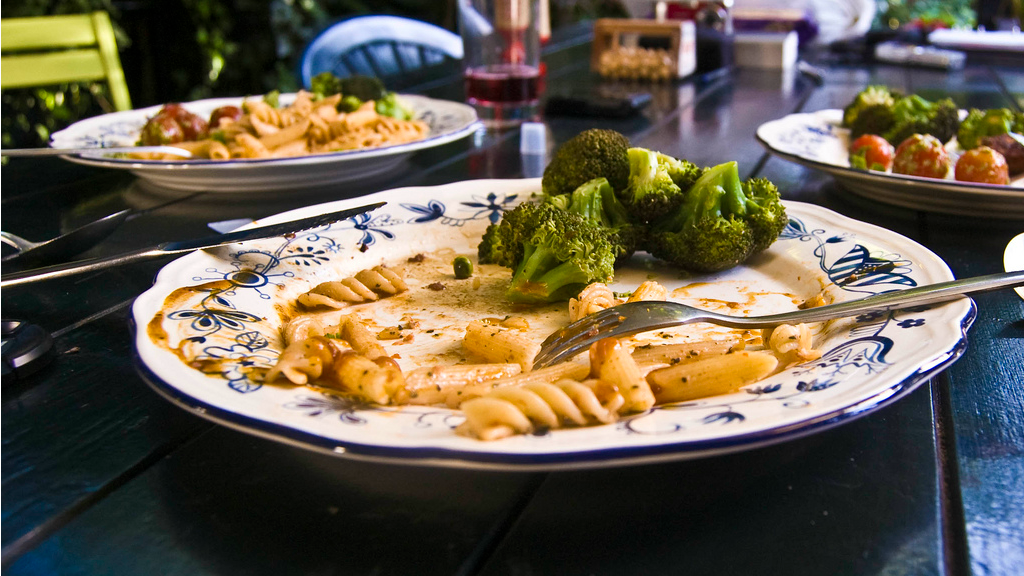There’s a curious sentence in Psalm 23 that unsettles me. David writes, “You prepare a feast for me in the presence of my enemies.” In the same passage where the king presents God as the Good Shepherd and celebrates his provision, he throws in this radical thought about eating with enemies as if that’s totally normal.
The idea of actually sitting down with those who might be on the opposite side of the ideological fence is appealing. But how do we move beyond our default behaviors of avoiding and marginalizing our enemies to breaking bread with them?
Surrounding ourselves with people who look and think like us is a difficult habit to overcome. Sameness brings us comfort (we don’t need to explain ourselves), acceptance (we tend not to judge those who are like us), and at least a semblance of peace (we are less likely to fear those who resemble us).
One could argue that this tendency is simply human nature, done reflexively and without malice. It’s also human nature to steal, lie, and cheat. So why do most of us try to resist stealing, lying, and cheating but give ourselves permission to remain in largely insular subgroups?
While some would attribute this tendency to genetics and/or education, the spiritual components should not be overlooked. Unforgiveness, envy, pride, anger, and perhaps—most deeply—fear, all serve as barriers to those who are unlike us.
Fear combines the physiological/biological component that causes our hearts to race and our palms to sweat with the deeper psychological/spiritual component of which we are largely unaware but often beholden. Our fear of those who are different has two roots: scarcity and compromise.
Even when we are not in danger, we may fear engaging with those who are opposed to or different from us because we believe that there is only a limited amount of goods (power, food, jobs, etc.) to go around. If I lower the barricades and cozy up with my ideological opponents, won’t my share diminish? This belief runs on the assumption that the world’s resources are finite and we’re essentially on our own to provide for ourselves.
The authors of Slow Church, C. Christopher Smith and John Pattison offer a contrasting perspective: “We live in a culture that is driven by an economy rooted in the myth that there is not enough, but we also live within the biblical narrative that repeatedly emphasizes that God created the world and loves it immensely and will sustain it.” In order to actually believe the more compelling biblical narrative, we must feed our faith and starve our fear—a feat we can accomplish when we give generously and thank God continually.
Fear of compromise is a more difficult weed to uproot. What if that person who lives, thinks, and votes differently than me has a valid point? Am I willing to have my worldview turned inside out? We are particularly vulnerable to being held captive by fear of compromise when our identities are wedded to our ideologies. If I link my self worth to being an opponent of the death penalty, an advocate of gun reform, and a feminist, I will become defensive the moment a man who belongs to the NRA, supports the death penalty, and is a card-carrying misogynist walks in the room and opens his mouth. But if I find my identity first and foremost as a child of the King, then I’m neither higher nor lower than anyone else and just maybe, I could actually treat this man like my brother—even if we never agree on certain topics.
Our benevolent King cares passionately about how we perceive and treat each other. Most of us would agree that the current divisive and defensive dynamic makes it difficult to obey God’s mandate to step out of our comfort zones and share his kingdom with people from every tribe and every tongue—not just those who agree with us.
What better way to accomplish this than by eating together? Again quoting Slow Church, "The common meal forces us to pull our convictions down from the clouds of abstraction and work them out together in our very specific context."
The Apostle Peter had spent his entire life scrupulously adhering to kosher dietary laws. Then, as Acts 10 recounts, the Holy Spirit gives Peter a surprising directive: Go hang out with Cornelius, a Gentile. This rocked him because he considered both Gentile food and the Gentiles themselves unholy. Rachel Marie Stone writes in Eat With Joy, “Peter was giving up his lifelong foodways–tantamount to his very identity–for the sake of Christ, unifying himself with those whom he’d always regarded as unclean.” As Peter’s experience in Caesarea demonstrates, sometimes engaging with those who disagree or are radically different makes space for God’s Kingdom to break in: Cornelius’s household became believers as a result of his obedience.
Could it be that God actually expects us to drop our defenses, listen to each other, and become a more dialogical and thus Christ-like people in the context of sharing food? In the final chapter of Slow Church, Smith and Pattison conclude, “Maybe by recovering the ancient formative practice of the common meal, our churches can bear witness to the possibilities of diverse and peaceable conversations in a deeply fragmented culture.”









